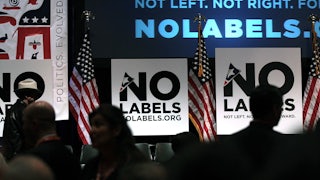On the surface, the connection between Mark Penn and the No Labels political group is minimal. Penn himself says it’s nonexistent. The longtime Democratic strategist who established himself as a top adviser to both Bill and Hillary Clinton before he was exiled from Clinton world is married to Nancy Jacobson, the activist and CEO of No Labels. That seems to be it.
But certain connections are there. Penn is the CEO and managing partner of Stagwell. Stagwell is a company with holdings that include both the polling firm HarrisX, which No Labels pays to conduct its polling, as well as the Republican consulting firm Targeted Victory, and SKDK, a firm with connections to the Biden White House. And, of course, there’s his marriage to Jacobson. And finally, to the extent that many Democrats from left to center see No Labels as a vehicle to throw the election to Donald Trump, there is a pretty long trail of comments Penn has made—on Fox News, no less—that promote Trump’s candidacy and disparage Joe Biden’s.
Penn says his involvement is zero. “I have no role, real or imagined, in this No Labels effort,” Penn told The New Republic. “No Labels is the 14-year project of my wife Nancy Jacobson to promote bipartisanship. The effort to get ballot access is purely her idea and entirely under her leadership. I am happily out of politics and have no interest in getting back in beyond polls and commentary.”
A spokesperson for Penn, speaking on background, maintained Penn has no part in No Labels and there is no conflict of interest between Penn’s position as CEO of Stagwell and No Labels.
The Democrats interviewed for this story, many of whom are involved in efforts to try and prevent No Labels from propping up its “unity ticket,” aren’t so sure. They see Penn as keeping a secret hand in the direction of the outside group and say he is driven by a mixture of frustration over being exiled from the Clinton orbit and a drive to retain relevance at all costs. One Democratic strategist who knows Penn and was granted anonymity to speak frankly said, “Mark’s about Mark.” This strategist said that Penn “wants to be deemed relevant.”
What has people up in arms is their conviction that a third-party “unity ticket” would steal far more votes from the Democratic nominee and thus grease reelection for Trump, the likely GOP nominee. No Labels has maintained—with the help of HarrisX polling—that the platform it’s currently creating for a “unity ticket,” of one Republican and one Democrat running for president, wouldn’t draw from Democrats and effectively give Trump (or another Republican) a clearer path to the White House. But outside polling shows the contrary.
“Penn knows and Nancy Jacobson knows that there’s somewhere way less than a nano-percentage that says they’re going to win this,” said Bo Cutter, a former Clinton administration official now involved in an effort to prevent a third-party win. “If you wanted to give them the best conceivable—a really, really good, fortunately positioned third party, you give them high teens. And high teens either outright gives the election to Trump or throws the election to the House, which gives the election to Trump. So you have to pull off something where the odds are way down and are way under 1 percent to do what they want to do, and everything else leads to a disaster.”
Cutter, like other Democrats, is skeptical that Penn and Jacobson actually believe what No Labels has been arguing: that a one-Republican-and-one-Democrat third-party ticket is what a majority of voters want and won’t just hurt Democrats. “There’s absolutely no example and nothing in voting behavior right now that’s suggesting that’s going to change,” Cutter said. “If anything, the MAGA forces are hardening around Trump.”
Joe Trippi, a veteran Democratic strategist, called the entire No Labels enterprise “really reckless and irresponsible under the guise of ‘we’re just a centrist group.’” Trippi scoffed at the idea that a Unity Ticket with a nominee of the type floated by No Labels—a Joe Manchin or a Larry Hogan—could actually win a majority of states. “They actually project that they could win Delaware when you look at their state map,” Trippi said, name-checking Joe Biden’s home state. “And what’s it all based on? It’s all based on the polling and the interviews of Mark Penn. That’s it. Other than that, there’s no other polls that show this. None.”
For Democrats, Penn is inextricably linked to the No Labels effort. Internally, at least to some, Penn is viewed as being tied to the group as well. One former No Labels staffer said of Penn’s connection to the organization, “I feel like he’s the Wizard of Oz.” Maryanne Martini, a spokesperson for No Labels, reiterated Penn’s denial, saying, “Mark Penn is not involved In No Labels and has no involvement in our polling.”
The Intercept has reported emails laying out in extensive detail how No Labels internally grappled with conflicts of interest about contracting out to firms linked to Penn. The Intercept has also reported on Penn’s involvement in a Problem Solvers Caucus effort to prevent Nancy Pelosi from becoming Speaker of the House. The Problem Solvers Caucus was borne out of meetings held by No Labels.
Penn has been a regular presence on Fox News, writing op-ed pieces warning about Democrats’ tone deafness and arguing that Joe Biden’s chances of reelection, even against Donald Trump, are slim. “President Joe Biden seems dead set on running for re-election even though no president with a job rating as low as Biden’s has ever gotten re-elected,” Penn wrote in a #slatepitch-style piece about how Donald Trump’s indictment changes the 2024 race in a way Democrats may not expect (that is, it helps Trump). “His best chance, many strategists believe, is to run a re-match against Trump. But our recent polling shows that Biden loses to Trump in a rematch given the state of the economy, immigration, and crime.”
In an appearance on Fox News last November right before the midterms, Penn sounded strong skepticism about Democrats’ midterm argument that “democracy was on the ballot” and that Republican candidates at large were democracy deniers. “The fascinating thing to me is that the Democrats have said ‘threat to democracy’ is really the thing that they’re running this campaign on,” Penn said. “I think the Biden administration did threat to democracy, they did student loans, they did marijuana pardons, and they did a million dollars of gas out of the petroleum reserve. They did not confront these issues in any meaningful way. They became inflation deniers. And that, really, I think was a stupid strategy. We’re going to see whether or not I’m right and that was probably one of the worst strategies I’ve ever seen in a midterm, or they were right and they had some tough issues and they decided to completely avoid them.”
Spoiler: Democrats were more right than Penn, and what was supposed to be a red wave election cycle was more like a light red misting.
In the larger history of top Democratic political operatives, Penn’s position today in the This Town ecosystem is radically different than it once was. Since 1996, Penn was the longtime pollster to Bill and Hillary Clinton. But in 2008 he was forced to step down as chief political strategist to Hillary Clinton’s first ill-fated presidential campaign over disagreements with the campaign and revelations over his “business arrangements,” according to The New York Times.
Since then, Penn has slowly drifted away from the center of Democratic politics and even away from the moderate branch of the party. During Trump’s presidency, Penn even counseled the 45th president on being impeached.
Penn may have no direct role in No Labels. But doing commentary like he does, and advising Trump on impeachment, and continuing to poll on political questions isn’t exactly being “happily out of politics” either. As long as he’s doing those things, and it’s obvious that a No Labels candidate will hurt the Democrat, it seems reasonable that people will have questions.






